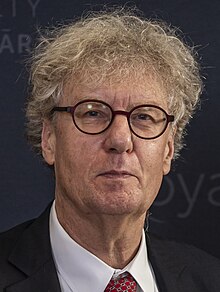Jack Copeland
Jack Copeland | |
|---|---|
 | |
| Born | Brian Jack Copeland 1950 (age 73–74) |
| Nationality | British |
| Alma mater | University of Oxford (BPhil, DPhil) |
| Scientific career | |
| Fields | Philosophy Logic Alan Turing |
| Institutions | University of Plymouth University of Canterbury |
| Thesis | Entailment : the formalisation of inference (1978) |
| Doctoral advisor | Dana Scott[1] |
| Website | www |
Brian Jack Copeland (born 1950) is Professor of Philosophy at the University of Canterbury, Christchurch, New Zealand, and author of books on the computing pioneer Alan Turing.[2][3][4]
Education
Copeland was educated at the University of Oxford, obtaining a Bachelor of Philosophy degree[when?] and a Doctor of Philosophy degree in 1978,[5] where he undertook research on modal logic and non-classical logic supervised by Dana Scott.[1]
Career and research
Jack Copeland is the Director of the Turing Archive for the History of Computing,
Copeland has held visiting professorships at the
Copeland is also President of the US Society for Machines and Mentality

Jack Copeland and Diane Proudfoot suggested the establishment of a Turing Center in Zurich during a guest stay at ETH Zurich in 2012. The idea was implemented and ETH Zurich was able to open the Turing Center Zurich in 2015. It is operational organizes regular conferences on questions related to computer, artificial intelligence and other.
The Rutherford Journal
OCLC no. | 145735058 |
|---|---|
| Links | |
Copeland serves as
The journal is indexed in various index lists.
Publications
- ISBN 0-631-18385-X
- Logic and Reality Essays on the Legacy of ISBN 0-19-824060-0
- The Essential Turing (Oxford University Press, 2004) ISBN 0-19-825079-7 (hbk)[24]
- Alan Turing’s ISBN 0-19-856593-3
- ISBN 0-19-284055-X[25]
- Alan Turing’s Electronic Brain: The Struggle to Build the ACE, the World’s Fastest Computer (Oxford University Press, 2012)
- Computability: Turing, )
- Turing: Pioneer of the Information Age (Oxford University Press, 2014: Paperback edition)
- , Mark Sprevak, et al.)
Awards and honours
Copeland was awarded Lecturer of the Year 2010 by the University of Canterbury's student union.[31]
References
- ^ a b Jack Copeland at the Mathematics Genealogy Project
- ^ "Jack Copeland". University of Canterbury. Retrieved 16 August 2022.
- ^ Alan Turing: Father of the Modern Computer
- ^ Jack Copeland at DBLP Bibliography Server
- EThOS uk.bl.ethos.452218.
- ^ "Turing Archive for the History of Computing". Archived from the original on 12 October 2018. Retrieved 16 April 2007.
- ISBN 978-3-319-53278-3.
- ^ "Dibner Institute for the History of Science and Technology". USA: Massachusetts Institute of Technology.
- ^ Society for Machines and Mentality Archived 8 June 2007 at the Wayback Machine, USA.
- ^ "Distinguished Professor Jack Copeland". New Zealand: University of Canterbury. Retrieved 7 December 2016.
- ^ "New Zealand > Education > Academic Journals". indexNS. Retrieved 7 December 2016.
- ^ About the Journal, The Rutherford Journal.
- ^ Jenkin, John (2006). "Review of Copeland, Jack, ed., The Rutherford Journal: the New Zealand Journal for the History and Philosophy of Science and Technology (2005)". Historical Records of Australian Science. 17 (2): 298–299.
- )
- ^ Clarke, Simon (December 2005). "Rutherford at Canterbury University College". The Rutherford Journal. 1.
- ^ "The Rutherford Journal". Directory of Open Access Scholarly Resources. ROAD. Retrieved 7 December 2016.
- ^ "The Rutherford Journal". JournalIndex.net. Retrieved 7 December 2016.
- ^ "Rutherford Journal: the New Zealand journal for the history and philosophy of science and technology". UK: Intute. Retrieved 7 December 2016.
- ^ "History and Theory of Computation Sites". AlanTuring.net. Retrieved 4 January 2014.
- .
- S2CID 13335611.
- ^ Panos, Kristina (4 November 2015). "Tote Boards: The Impressive Engineering of Horse Gambling". Hackaday. Retrieved 7 December 2016.
- ^ McKenzie, Don (12 March 2011). "Was George Julius the inspiration for CSIRAC, Australia's first electronic digital computer?". Godzilla Sea Monkey. Retrieved 7 December 2016.
- S2CID 164782208.
- ^ Ferry, Georgina (29 July 2006). "The Colossus of codes: Georgina Ferry on four new books that tackle the story of Bletchley Park's other decryption machine". The Guardian. UK.
- ^ doi:10.1090/noti1155.
- ^ Moriarty, Tom (18 January 2015). "Turing: Pioneer of the Information Age, by Jack Copeland". The Irish Times.
- Logos: A Journal of Modern Society and Culture. 15 (2–3).
- S2CID 119031996.
- ^ Robinson, Andrew (4 January 2017). "The Turing Guide: Last words on an enigmatic codebreaker?". New Scientist.
- ^ "CANTA survey" (PDF). New Zealand: UCSA. March 2011. Archived from the original (PDF) on 20 January 2015.
